The charts that matter: bitcoin surges to a new record high
As bitcoin storms through its previous record high price, John Stepek looks at how it's affected the charts that matter most to the global economy.

Get the latest financial news, insights and expert analysis from our award-winning MoneyWeek team, to help you understand what really matters when it comes to your finances.
You are now subscribed
Your newsletter sign-up was successful
Want to add more newsletters?

Twice daily
MoneyWeek
Get the latest financial news, insights and expert analysis from our award-winning MoneyWeek team, to help you understand what really matters when it comes to your finances.

Four times a week
Look After My Bills
Sign up to our free money-saving newsletter, filled with the latest news and expert advice to help you find the best tips and deals for managing your bills. Start saving today!
Welcome back.
First things first, keep an eye out for a very special podcast landing in your inbox on Monday morning – Merryn has interviewed one of our favourite financial market analysts, Russell Napier. I won’t give you any spoilers here – suffice to say, it’s a must-listen. Don’t enter 2021 without it! Look out for it, Monday morning, first thing.
In the current issue of MoneyWeek, we look at IPO fever – is it really such a bad thing in a decade that has seen equity markets shunned as a place to raise capital? – and our regular writers give their top tips for the year ahead. That includes me, and I can only say I hope I do better than I did last year… get your first six issues free here if you don’t already subscribe.
MoneyWeek
Subscribe to MoneyWeek today and get your first six magazine issues absolutely FREE

Sign up to Money Morning
Don't miss the latest investment and personal finances news, market analysis, plus money-saving tips with our free twice-daily newsletter
Don't miss the latest investment and personal finances news, market analysis, plus money-saving tips with our free twice-daily newsletter
Also in this week’s podcast, after a succession of guests and City professionals and people whose opinions you might actually want to hear, I finally join Merryn again to chat about V-shaped recoveries, investment ideas for 2021, and how all in all it’s been a very weird year in more ways than one. Merryn also interviews a pair of entrepreneurs to find out how startup companies have coped in what certainly felt like a very hostile environment. Have a listen here.
Oh and just on podcasts – if you have the time or the inclination and the option to do so, do please leave a review (preferably a five-star one) on whatever podcast platform you use. It’s not just for our egos – the more good reviews we get, the more listeners we attract, and the more resources we can invest in developing the podcast to make it even better.
Speaking of IPOs, that’s what our latest “Too Embarrassed To Ask” video is all about. So if you’re confused as to what an IPO is, or why it happens, you can dispel that confusion in a little over two minutes’ viewing by clicking here.
And just to say – this’ll be the last Saturday edition of Money Morning until 9 January. But your daily Money Morning will soldier on through 2020 for a while longer.
Anyway, here are the links for this week’s editions of Money Morning and other web stories you may have missed.
- Monday: The market is looking bubbly – here's the best defence for investors right now
- Tuesday: Is the reflation trade already priced into markets?
- Wednesday: With Brexit back in the news, which way now for the pound sterling?
- Thursday: Bitcoin has hit a new record high – and this time the professionals are piling in too
- Friday: What the current state of the Brexit talks means for investors
Now for the charts of the week.
The charts that matter
Gold made a comeback this week as the most important event of all – the Federal Reserve’s latest meeting – passed by without any sign that the Fed will even consider raising interest rates until inflation is well and truly upon us. With a signal of intent that clear, it’s almost a surprise that gold isn’t higher than it is.
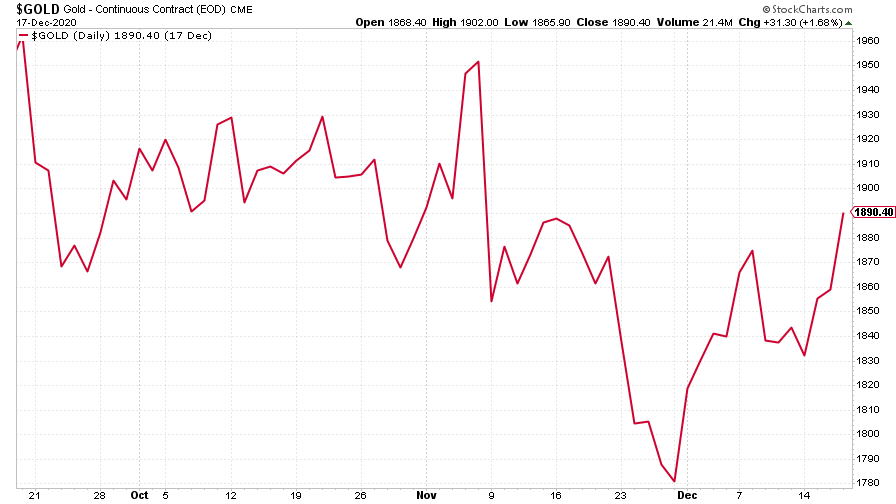
(Gold: three months)
The US dollar index (DXY – a measure of the strength of the dollar against a basket of the currencies of its major trading partners) slid decisively after the Fed meeting, and it’s getting harder and harder for dollar bulls to maintain the idea that this is a passing correction.
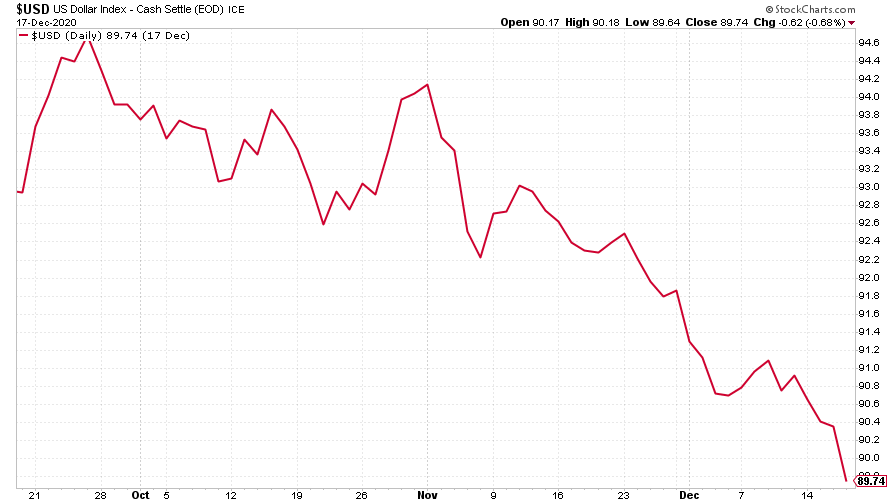
(DXY: three months)
The Chinese yuan (or renminbi) carried on rising against the US currency (when the black line below rises, it means the yuan is getting weaker vs the dollar). At some point, the Chinese will start to feel that this is a problem – it’s not good for their manufacturers – but so far we haven’t reached that point.
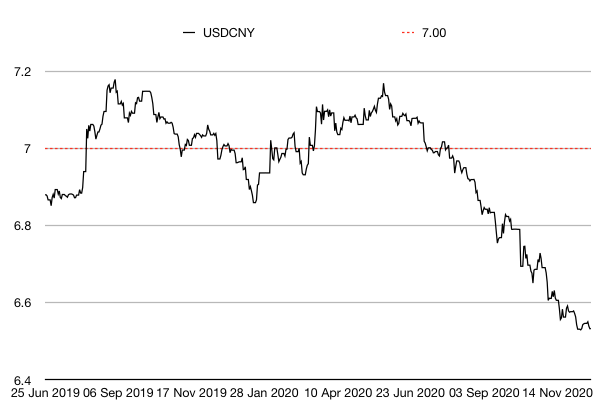
(Chinese yuan to the US dollar: since 25 Jun 2019)
The yield on the ten-year US government bond was little changed, but drifting higher.
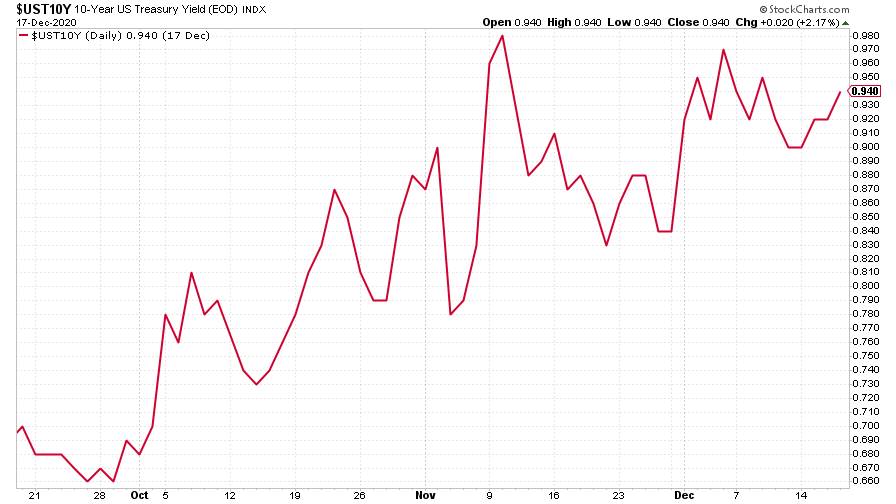
(Ten-year US Treasury yield: three months)
The yield on the Japanese ten-year stayed nailed to the floor.
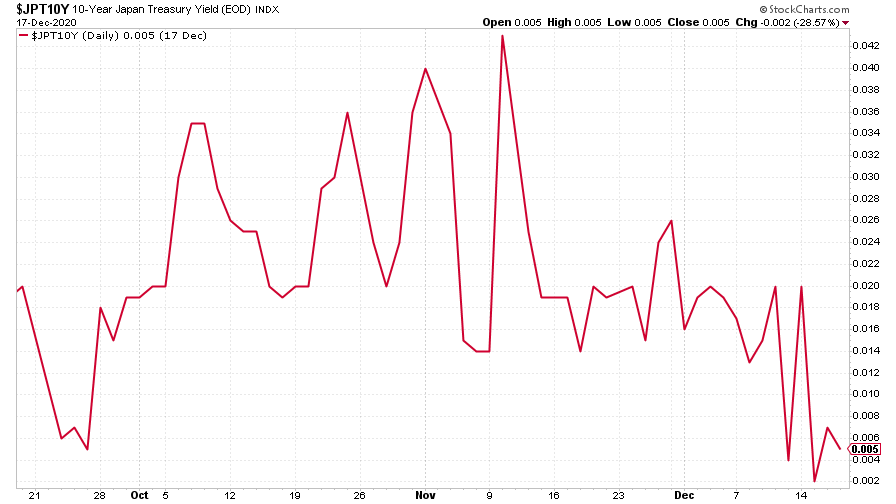
(Ten-year Japanese government bond yield: three months)
The yield on the ten-year German Bund perked up imperceptibly from last week.
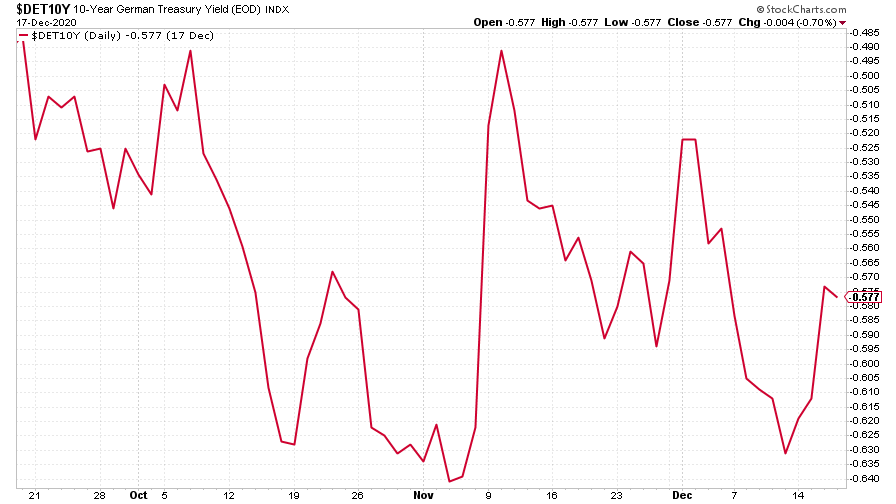
(Ten-year Bund yield: three months)
Copper kept rising as investors become ever more convinced of the “green bubble, reflation bonanza” scenario for next year.
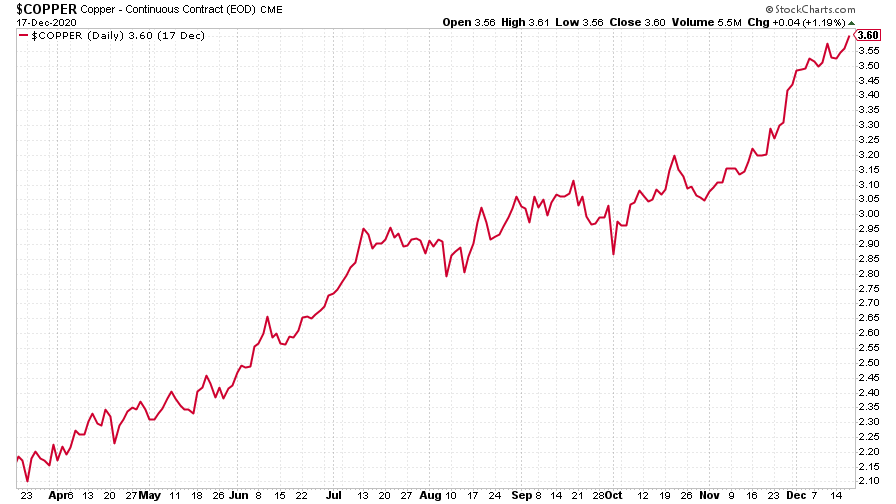
(Copper: nine months)
The Aussie dollar made further gains as it benefits both from demand for commodities and from the weakening US dollar.
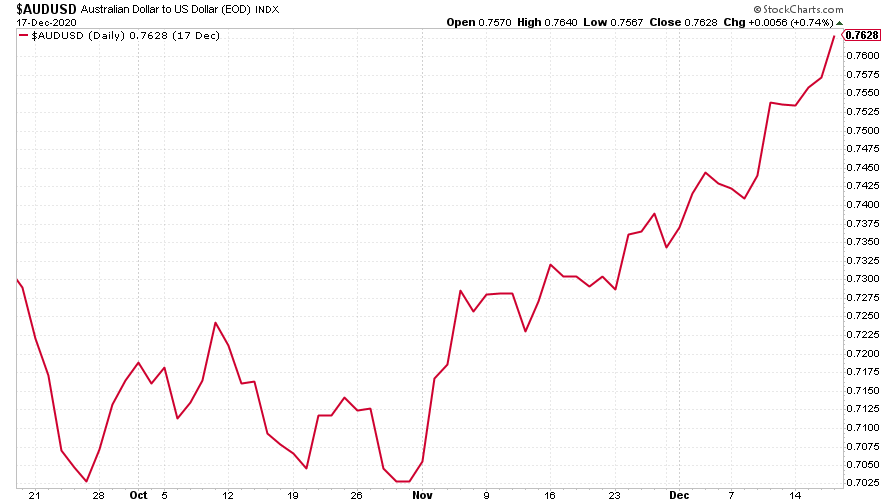
(Aussie dollar vs US dollar exchange rate: three months)
Cryptocurrency bitcoin had a stellar week. It finally broke decisively above the 2017 high, amid signs that it’s going mainstream.
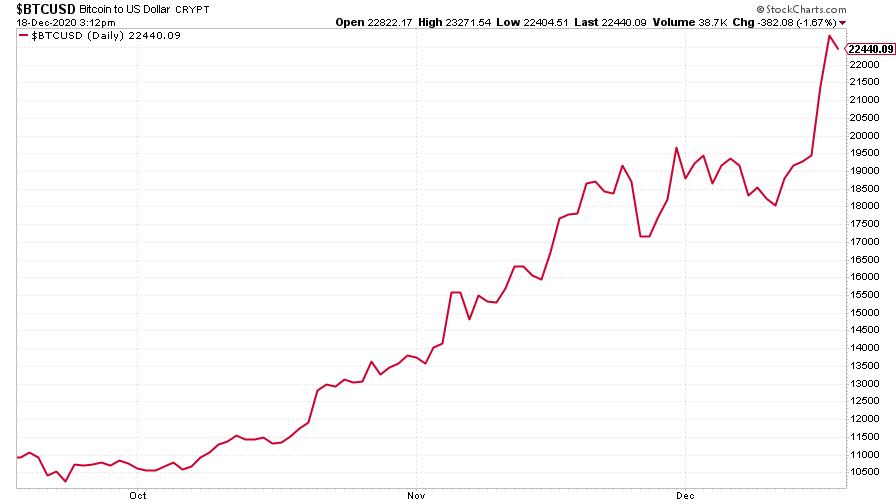
(Bitcoin: three months)
US weekly jobless claims rose even further this week, coming in at 885,000, compared to 862,000 last week (which was revised up from 853,000). Economists had been hoping for closer to 800,000. The four-week moving average rose to 812,500 from 776,000 the week before.
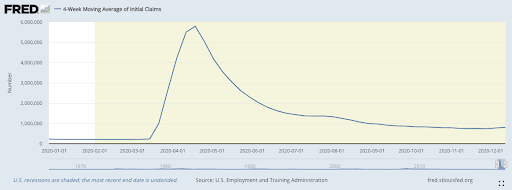
(US jobless claims, four-week moving average: since Jan 2020)
The oil price (as measured by Brent crude) also surged higher this week as more investors buy into the reflation trade as mattering more than the longer-term “we don’t need oil anymore” trade.
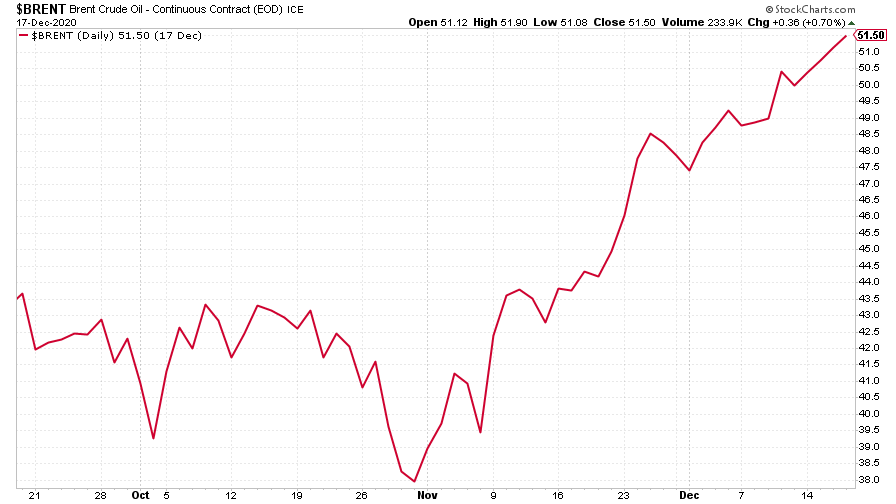
(Brent crude oil: three months)
Amazon drifted again as the background music grows ever more hostile to Big Tech, and because it’s also not a reflation trade stock.
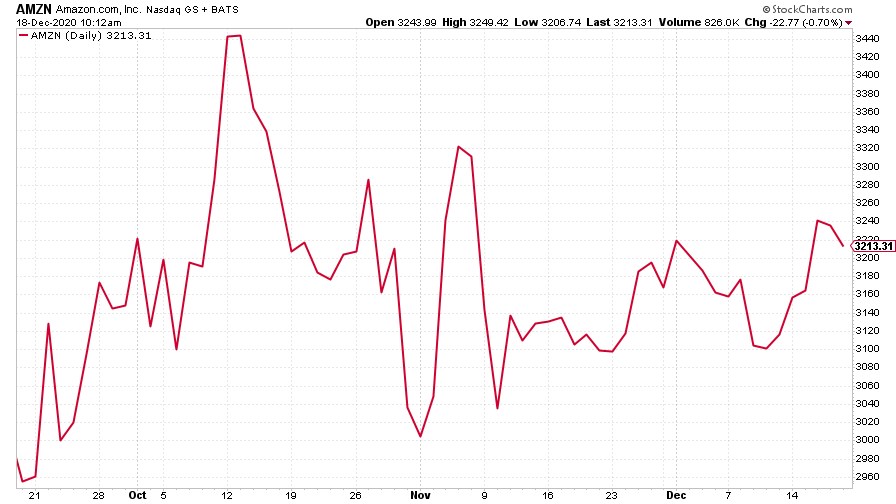
(Amazon: three months)
Meanwhile Tesla just kept going as its promotion to the S&P 500 looms next week. I am very curious to see what happens when it goes up into the “grown-up” index. Will that mark the top? Will the weird option-related shenanigans that have helped the stock cease to function properly? Will it be a case of “buy the news, sell the event”? We’ll soon find out, just in time for Christmas.
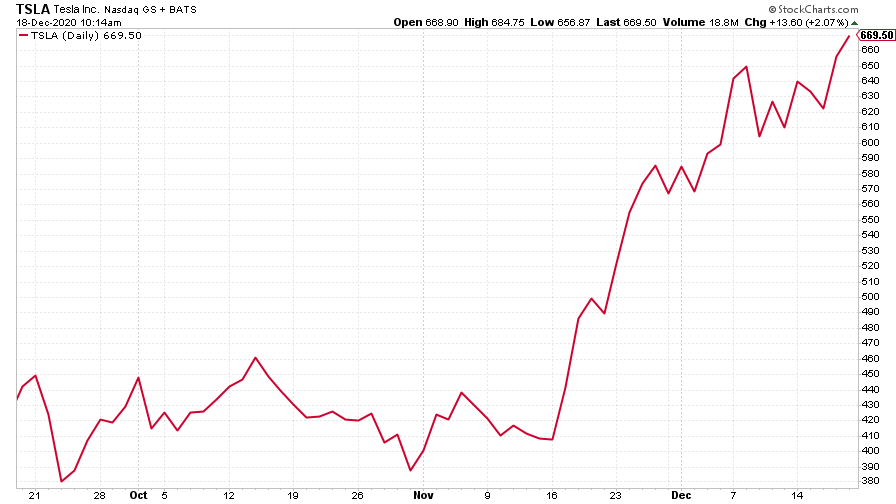
(Tesla: three months)
Have a great weekend. And don’t miss the Russell Napier podcast – it’ll be in your inbox bright and early on Monday!
Get the latest financial news, insights and expert analysis from our award-winning MoneyWeek team, to help you understand what really matters when it comes to your finances.

-
 Should you buy an active ETF?
Should you buy an active ETF?ETFs are often mischaracterised as passive products, but they can be a convenient way to add active management to your portfolio
-
 Power up your pension before 5 April – easy ways to save before the tax year end
Power up your pension before 5 April – easy ways to save before the tax year endWith the end of the tax year looming, pension savers currently have a window to review and maximise what’s going into their retirement funds – we look at how
-
 UK wages grow at a record pace
UK wages grow at a record paceThe latest UK wages data will add pressure on the BoE to push interest rates even higher.
-
 Trapped in a time of zombie government
Trapped in a time of zombie governmentIt’s not just companies that are eking out an existence, says Max King. The state is in the twilight zone too.
-
 America is in deep denial over debt
America is in deep denial over debtThe downgrade in America’s credit rating was much criticised by the US government, says Alex Rankine. But was it a long time coming?
-
 UK economy avoids stagnation with surprise growth
UK economy avoids stagnation with surprise growthGross domestic product increased by 0.2% in the second quarter and by 0.5% in June
-
 Bank of England raises interest rates to 5.25%
Bank of England raises interest rates to 5.25%The Bank has hiked rates from 5% to 5.25%, marking the 14th increase in a row. We explain what it means for savers and homeowners - and whether more rate rises are on the horizon
-
 UK inflation remains at 8.7% ‒ what it means for your money
UK inflation remains at 8.7% ‒ what it means for your moneyInflation was unmoved at 8.7% in the 12 months to May. What does this ‘sticky’ rate of inflation mean for your money?
-
 Would a food price cap actually work?
Would a food price cap actually work?Analysis The government is discussing plans to cap the prices of essentials. But could this intervention do more harm than good?
-
 Is my pay keeping up with inflation?
Is my pay keeping up with inflation?Analysis High inflation means take home pay is being eroded in real terms. An online calculator reveals the pay rise you need to match the rising cost of living - and how much worse off you are without it.